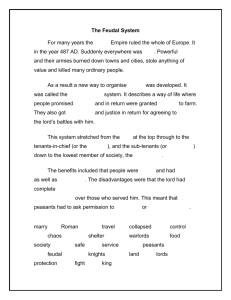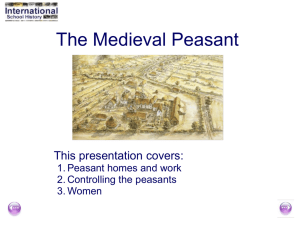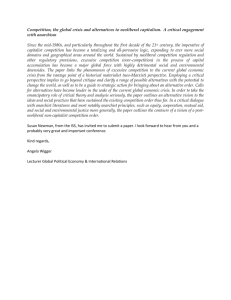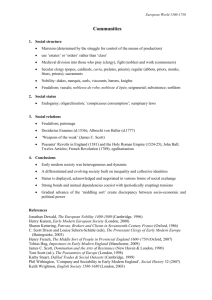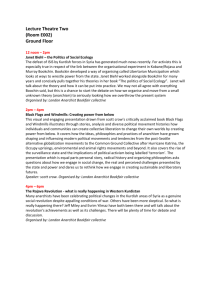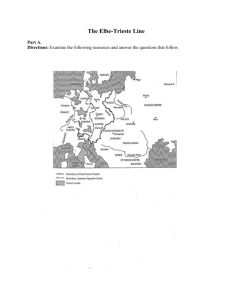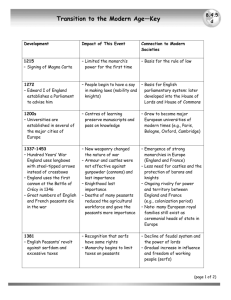Egalitarianism, the teachings of fieldwork and
advertisement
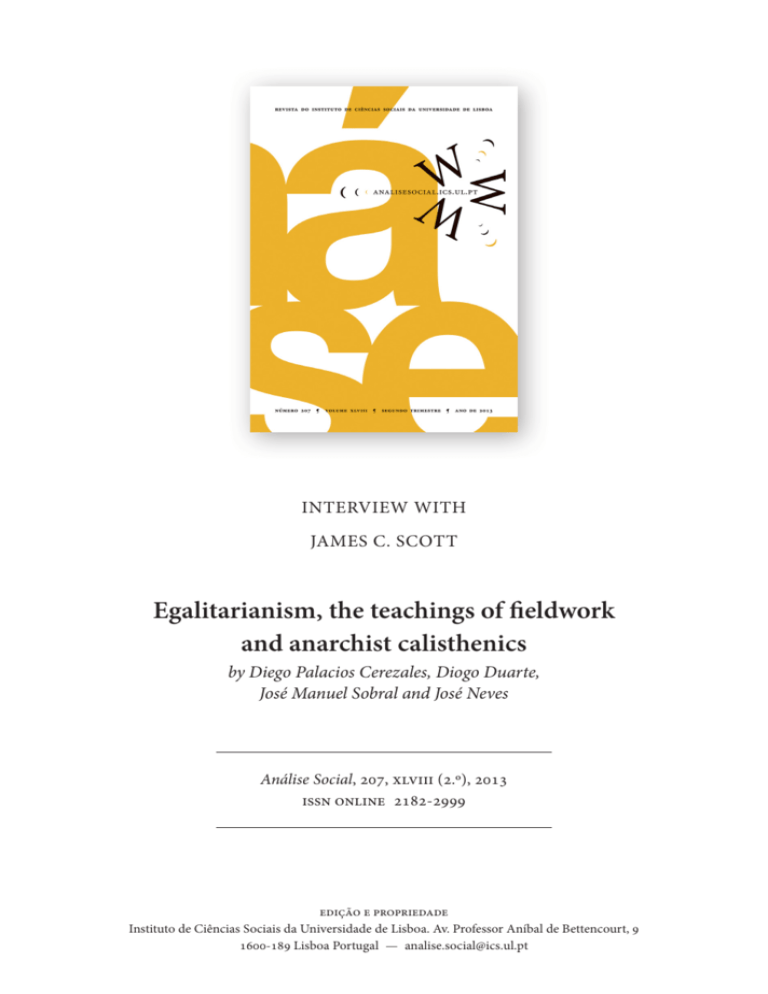
INTERVIEW WITH JAMES C. SCOTT Egalitarianism, the teachings of fieldwork and anarchist calisthenics by Diego Palacios Cerezales, Diogo Duarte, José Manuel Sobral and José Neves Análise Social, 207, xlviii (2.º), 2013 issn online 2182-2999 edição e propriedade Instituto de Ciências Sociais da Universidade de Lisboa. Av. Professor Aníbal de Bettencourt, 9 1600-189 Lisboa Portugal — analise.social@ics.ul.pt I N T E RV I E W Egalitarianism, the teachings of fieldwork and anarchist calisthenics Interview with James C. Scott by Diego Palacios Cerezales, Diogo Duarte, José Manuel Sobral and José Neves J ames C. Scott is Sterling Professor of Political Science and Anthropology at Yale University where he directs the Program in Agrarian Studies. Author of foundational books on the fields of Agrarian studies and Social Movements (but with a wider resonance in other domains of social sciences), namely The Moral Economy of the Peasant: Rebellion and Subsistence in Southeast Asia (1977), Weapons of the Weak: Everyday Forms of Peasant Resistance (1985), and Domination and the Arts of Resistance: Hidden Transcripts (1990), Scott recently published The Art of Not Being Governed: An Anarchist History of Upland Southeast Asia (2009). His work has been a major source of inspiration for the four of us and we therefore invited him to visit Portugal in order to discuss some of the key-elements of his research. The following conversation took place in Lisbon, April 2012, and gathered many students and researchers from both Portugal and Spain. The conversation was first directed by our own questions and we then opened the floor for discussion, taking some questions from the audience. The subjects discussed ranged from Scott’s participation in the Perestroika Movement in Political Science to his critique of the State and the concept of high-modernism (see Seeing like a State – How Certain Schemes to Improve the Human Condition Have Failed, Scott’s 1998 book). The conversation also included his perspectives on resistance and their relation to contributions made by authors such as E.P. Thompson, Michel Foucault, and Pierre Clastres, among others. Finally, we also discussed the possibility of an “anarchist turn” in social sciences and came to know Scott’s law of anarchist calisthenics, and some hints about his new book, Two Cheers for Anarchism: Six Easy Pieces on Autonomy, Dignity, and Meaningful Work and Play (2012).1 1 James C. Scott visited Portugal to participate in the research activity of the fct project “The Making of State Power in Portugal 1890-1986” (ptdc/his-his/104166/2008). Besides the financial support of fct, Scott’s visit also benefited from the financial support of flad. 448 INTERVIEW WITH JAMES C. SCOTT ✳ interviewers Let us start with some questions concerning your early academic formation, which, as far as we know, had a more direct connection to Political Science. So, how did you get to Anthropology and how did Anthropology come to have such an important place in your work? james c. scott Thanks. I’m both flattered and terrified by the number of people here and also by the change of venue. The other room was small and cozy and this is an intimidating room. Because of its hierarchical structure, I feel that I should be operating on some patient and changing a kidney. So, the room requires something more important of me than I have to say and I want you all to know that you can all live a long and happy life without listening to me. I was trained as a political scientist and the question of how I became an anthropologist, a fake anthropologist, grew out of my work on peasants. I wrote a book called Moral Economy of the Peasant – Rebellion and Subsistence in Southeast Asia a long time ago [1977], my first major book, based entirely on library resources and archival work. After I published it, people asked me where I had done my fieldwork and the fact is I had done no fieldwork. So, I was embarrassed to even answer their questions. Because I had decided to devote my career at that point to studying peasants, I thought that, if I am going to do it, I need to spend two years or so in a peasant village, so that every time I am tempted to make some big generalization, I have a real place I understand and that I can test these generalizations against. So, I spent two years in a Malaya village, the result was Weapons of the Weak, as you may know. The fact is that I am a defector, a deserter from the army of political scientists and I formally have never been trained as an anthropologist. About fifteen years ago, when I gave a small talk in Toronto, the poster said “James Scott, social anthropologist from Yale”. It was the first time someone had mistaken me for an anthropologist and I was so proud, I saved the little poster. It’s like someone who wants to be accepted as a member of a tribe and is refused and then, finally, I had this moment in which I had passed, as we say, as an anthropologist. I have always had Anthropology envy and I’m happier in this tribe than I have been in my Political Science tribe. int In your analysis, as we have discussed this morning, the people’s understandings of their own situation, their worldviews, are very important. Do you think that there is something biographical in this relevance? Does it reflect the democratic ideals you were socialized in? jcs I haven’t thought about that question… I can tell you a story about the connection but I’m not sure the story is true. We all tell stories about ourselves. Let EGALITARIANISM, THE TEACHINGS OF FIELDWORK AND ANARCHIST CALISTHENICS me begin the answer with a story I like very much, by Jean-Paul Sartre. I think in L’Être et le néant (Being and Nothingness), he creates a situation in which a man faces a choice of whether to stay with his sick mother or to go away with his wife who’s leaving for another job. He doesn’t know what to do: these are both obligations that he has. But the day arrives, just the way a strike arrives and people have to decide to go on strike or stay at the factory. Anyway, the day arrives and, let’s say, the man decides to stay with his sick mother. Sartre’s argument is that the next day he can give you a story about why he’s the kind of man who would have stayed with his sick mother. It doesn’t explain why he did what he did, it just means that he has to create a story on the next day to understand himself. In the same way, people point to connections in my work that I’m not sure really exist but I will tell the story that is appropriate to your question. I went to a Quaker school. I don’t know if you know much about Quakers, but historically it was an austere protestant sect that grew up in the English Civil War. They refused to say “Sir”, “Ma’am” or “Mr.”, they refused to take off their hats, they called everybody by their first name. It was a kind of linguistic egalitarianism, if you like. And they were a radical sect. The first head of the Quakers was broken, essentially, in the Cromwellian reaction. In the school in which I grew up there were many conscientious objectors from the Second World War, elderly men who had gone to prison rather than fight in the army. As you can imagine, this was not a popular thing to do and so I had, in that sense, the example before me of men who had gone to prison and who were capable of standing in a crowd of a hundred and being the minority of one. I think the Quakers taught me how to stand up in a crowd of a hundred and be a minority of one. The Quakers could do it while loving their enemies; I cannot do this. I can only stand up as a minority, being angry actually. So, I don’t have the true Quaker spirit. But the Quakers had one other thing, which is at the center of their doctrine of “the light of God in every man”, whether a beggar or a slave. The Quakers were responsible for prison reform, for the so-called underground railway that took slaves to Canada through a succession of farms all the way north, so that they could escape. They were responsible for most of the education for Native Americans. There was a kind of Quaker “work-week” in which we would spend a week among the very poorest of Philadelphia. It was a kind of tour of the dispossessed that the Quakers gave me and that had a big influence. I was not brought up in a Quaker family, as my parents were both atheists. I later became briefly a Quaker although today I don’t practice Quakerism. The school had a tremendous influence on me. My father died when I was nine years old and so the school became a kind of surrogate parent for me. But, again, this is a story I tell and it is as true as any other story I would tell you. It makes a connection that I’m not completely certain of. 449 450 INTERVIEW WITH JAMES C. SCOTT int The Moral Economy of the Peasant aroused an intense debate within peasant studies and, especially, between you and Samuel Popkin, who wrote a book to refute your thesis. The terms of that debate were not entirely new, and reproduced some old discussions opposing anthropologists’ views on the importance of culture for understanding economy to more utilitarian arguments. That debate was crucially relevant to economics and to anthropological perspectives on the individual and the social, but also had a deeper epistemological meaning. Do you think that this is a discussion that still makes sense nowadays and, if so, in what way do you think that the terms of this debate have changed since then? jcs For those of you who may have read Samuel Popkin’s The Rational Peasant – The Political Economy of Rural Society in Vietnam [1979] and my earlier book The Moral Economy of the Peasant, this may make some sense. My one regret about that debate is calling my book The Moral Economy of the Peasant, which suggested to some people that I thought peasants were altruists, willing to lay down their life for their fellow men and that this was “one for all and all for one”, a kind of primitive communist society. But I made it quite clear that the peasants, as I was understanding, behaved completely rationally and that they wished to protect themselves against the worst outcomes of a food shortage by social arrangements that provided some insurance against the worst outcomes. In that sense, I had a picture of completely rational peasants who were operating under very difficult conditions in order to make sure that their food supply problems did not result in famine and starvation. I thought my book was a study of rational peasants. Once Samuel Popkin called his book The Rational Peasant it implied that I had a theory of crazy or altruistic peasants. I think it was very clever: it misrepresented the debate and, of course, as you imply, the two books were then taught as a kind of “evil twins” in lots of classrooms and I think it was a classroom success as teaching a debate, although I thought the title led to a lot of misunderstandings. The question is whether this debate is valid today, I think the answer is yes, that is to say, that in Economics and in Political Science the idea of the individual maximizing agent is at the very center of Neoclassical Economics and of much of the Rational Choice Theory in Political Science. Although I think Rational Choice Theory has some important things to teach us, the point in The Moral Economy of the Peasant is that arrangements that may have had a rational basis, over time, if they are valuable and become customary, acquire a kind of moral value, so that when they are broken or violated, the reaction is not just to a loss of calories or income, but it is a reaction that has a moral tone of the violation of a kind of social contract. You can’t account, I think, for the rage, anger, and indignation of peasants unless you take into account, if you like, the surplus indignation beyond what is EGALITARIANISM, THE TEACHINGS OF FIELDWORK AND ANARCHIST CALISTHENICS rationally derivable. And it seems to me that we can say this about all of our choices, even though many people speak in a kind of neoclassical vocabulary about personal relations (in English and American English, people will say “I’m very invested in her” and “I have to cut my losses”, etc). This vocabulary has become hegemonic when in fact we know nobody makes choices like this that aren’t infused with an embedded combination of received ideas about what is fair, just, customary, traditional in the social contract, in addition to rational calculation, which has a place but not the hegemonic place in our decision making about anything. int You have criticized the idea that subordinates comply with the existing order because they accept the dominant ideology. But in your work you have mainly dealt with forms of domination linked to slavery, property, class, and political power. Don’t you think that some types of inequalities are more widely accepted, like the ones linked to the possession of cultural or scholar capital? And doesn’t this mean that those who have less or no access to them believe in the importance of these capitals? jcs I think your question is correct and important. In The Moral Economy of the Peasant, Weapons of the Weak and Domination and the Arts of Resistance, I chose on purpose, deliberately, situations in which the binary relationship was strong (serfs and masters, slaves and masters, peasants and landlords, untouchables and brahmans) partly because there was a literature that would allow me to understand both sides of these binaries. It seems to me that when you have, let’s say, a valuable prestige good like wealth or education that is, in principle at least, attainable by all, then it is much easier to legitimate differences. Of course, in the Modern post-French Revolution Republic the mythology is that the differences that exist are based on meritocratic criteria: achievement, education, degrees, skills, and so on. In that respect, and this is a very crude way of understanding contemporary democracy, but it is a good point of departure, in the neoliberal West political life is organized for the benefit of the top 15% or 20% of the income distribution. They control the legislation, the money, the parties and so on. The trick in an election is to persuade the next 30% to fear the bottom 50% more than they envy the top 20%. This is the shamanistic magic of every election. It doesn’t always work, but for the most part it works because, as Gramsci understood, the positional advantages of entrenched wealth’s influence in the media, and so on, has an enormous power to convince this 30% that their position is tenuous as well. In that respect, the possibility of legitimating differences in life chances, and in esteem for that matter, in modern secular democracies is much greater than it was in the systems that I analyzed in my work. 451 452 INTERVIEW WITH JAMES C. SCOTT int Your work cuts across disciplines and you are a stern critic of narrow-minded disciplinary focus in mainstream political science. You have even been a reference for the “Perestroika movement” in Political Science. Also, you always pointed to the value of other contributions to social analysis, like the ones coming from fiction, which you used very creatively in Domination and the arts of resistence, for example. Nevertheless, nowadays teaching and research seem even less interdisciplinary than thirty years ago. Is this the dominant trend? What do you think about it? jcs First, let me say something about my own practice. I don’t think I have an interdisciplinary method that I follow; that is to say, I don’t have a set of rules about how I should spend my time. The fact is I am bored silly by Political Science and so the reason that I began with friends a program on Agrarian Studies is that if someone told me that there was a talk in the other room about peasants or agriculture, chances are about 70% or 80% that I would go and learn something. If someone told me that there was a talk in Political Science around the corner, chances are maybe 15% or 20% that I would be enlightened and learn something. My interdisciplinarity is a product of boredom and a desire to relax with things that are more fun to read. I can actually give you an intellectual justification for this – the ethos of play – but the serious intellectual explanation for this is that if you only read mainstream things in your own discipline and if you only talk to people who are doing mainstream work in your own discipline, you are condemned to produce mainstream disciplinary work. It’s the health food dictum that “you are what you eat”: in the same way, intellectually, you are what you read and who you talk to. I think I would disagree with the idea that the discipline is headed in the other direction. It is true to say that, particularly, American social science is hyper-specialized and they hire, promote, and fire people depending on these hyper-specialized ideas of the discipline. They produce journals that are so specialized that we actually know from research almost no one reads them. People are promoted on the basis of an article in a peer review journal but no one reads the peer review journal, only the peers who review it to put it in the journal. They have done a study in which they tried to figure out the number of people who actually read a social science article on average – good, bad, and mediocre journals. The number is less than two. So, let’s imagine that the methodology is wrong and it’s wrong by a factor of four; let’s imagine that eight people read an average social science article. Well, why you would be doing this, right? You’re not paid well, you work very hard and there are only eight people in the world who read your work. It seems to me if you’re producing for that kind of narrow niche market, you may get tenure, you may thrive, but you must have no illusions that you’re making any difference at all in the world. EGALITARIANISM, THE TEACHINGS OF FIELDWORK AND ANARCHIST CALISTHENICS This is like medieval scholasticism, an internal game. I actually think that the tide has turned against formal modeling and purely quantitative and rational choice work, partly because of the “Perestroika movement”, but not only because of that. There’s more emphasis on qualitative techniques, and so, I’m not generally an optimist, but I think the wave has crested for purely formal modeling and purely quantitative work. int Your work relates itself to two legacies that are often set apart: the legacy of E. P. Thompson, and the legacy of Foucault, namely his studies on la gouvernamentalité, power, and resistance. And, to put it simply but openly: what was it that Foucault brought to your perspectives that Thompson hadn’t. And what do you think is shared by both of them? jcs That question actually calls for a day long symposium on E.P. Thompson and on Foucault, which we do not have time for. Aside from Karl Polanyi’s The Great Transformation, E. P. Thompson’s The Making of the English Working Class was perhaps the most important thing I read as a young scholar. I can remember the chair and the room in which I was sitting when I read it, it was so memorable. For me, the argument that class consciousness is a product of class struggle, rather than class struggle being a product of class consciousness, was brilliantly worked out. It’s not as if there’s a class conscious proletariat that then decides to struggle but that, in fact, a sense of classness comes out of struggles over the wage, over, as he says, ship biscuits and small things. Out of this, a sense of who we are and what we’re struggling for, emerges class consciousness. It is, as he says, the last term of class relations, not the first. I think it directs people who want to study class to the micro-politics of struggles at the ground level. For me, it was the first example of someone who had done this in a convincing way that I wanted to emulate in my own work. Foucault is, as we say in English, another kettle of fish. I think the most important of Foucault’s works to me was Discipline and Punish. I don’t think I could have written Seeing Like a State – How certain schemes to improve the human condition have failed without a sense of Foucault’s effort. He didn’t use the word legibility, which I use in Seeing Like a State, but, in a sense, he had a theory of legibility that I borrowed from very heavily. So, I am enormously in Foucault’s debt. The one thing – and I suppose one should not reproach a dead man – but the one thing I reproach Foucault for is that he kept promising a theory of resistance which he never delivered. That is to say, he was totally convincing about the capillary effects of power, legibility, control, the way power works at these micro levels. He then kept saying resistance could be understood in exactly the same way, but he never quite got around to filling the other side of that promise. I’m sure if he had, he would have taught me a great deal. 453 454 INTERVIEW WITH JAMES C. SCOTT I kept waiting. With each new book he published, I thought, “This is it, this will teach me about resistance!” I thought he was so mesmerized and so brilliant at describing the micro effects of power that he never got around to doing much in the way of analyzing resistance in the same way. int Agrarian Studies are an important part of your work and you were even responsible for the organization of an important seminar on this theme at Yale for more than a decade. We would like to know your thoughts about the increasing number of patents on seeds and plants and, specifically, how do you see this kind of phenomenon in the light of a work such as Seeing Like a State? jcs I don’t think I have anything more intelligent to say about that than the rest of you, probably. I haven’t made a special study of it, although I have a number of students who are interested in Monsanto and Genetically Modified Organisms (gmo). The effort which began in American Courts in the 1970s to patent life forms was a kind of enclosure of the commons, an enclosure of the botanical and organic richness of the world, in which you could then take an organic compound and by changing one amino acid you could patent this life form and sue anyone who infringed on that patent. The history of property is the imperial expansion of property to enclose things that you’ve never imagined were the subject of property relations. For example, the effort to privatize water supplies, to patent new forms of life, the drawing of blood from indigenous groups in order to patent certain enzymes that they have and other people don’t. It seems to be the final frontier of property relations. In a way, that is, the destruction of a natural commons that we all ought to have equal rights to and not ought to be the subject of monopolistic private property claims. int In the present day it seems that there’s a kind of return to anarchist ideas and principles going on. This is perhaps more visible at the political/activist level but also at a scientific level. The title and subtitle of your last book speaks for this: The Art of Not Being Governed – An anarchist history of upland Southeast Asia. And one could also mention the work of your American and anthropologist colleague David Graeber, for instance, with his Fragments of an Anarchist Anthropology. What kind of implications in the social sciences can we expect from such an “anarchist turn”. Will there be an implication at the level of methodology, of epistemology, of ethics, of the style of writing? jcs Also an interesting question to which I think I may have something to add. At the beginning of my efforts to understand peasant revolutions, I realized that almost every revolution I studied had actually created a stronger State that was able to batten itself on the population more severely and comprehensively than the State it replaced. This makes for sad and melancholy reading of the EGALITARIANISM, THE TEACHINGS OF FIELDWORK AND ANARCHIST CALISTHENICS histories of revolutions that create stronger and often more repressive States. A friend of mine once said, “You know, once the revolution becomes the State it becomes my enemy”. I thought this was a good observation. So, I found myself saying things that before they were out of mouth, I realized in my head, “That sounds like what an anarchist would say”. And it happened enough: two points make a line in geometry, but when the third, the fourth, the fifth, and the sixth points all fall down on the same line, you have to pay attention. So, I decided to teach a course on Anarchism at Yale and did so for three years, which, as you can imagine, brought the entire undergraduate left into one room. If you had dropped a bomb on my classroom, you would have destroyed the undergraduate left at Yale University in one blow. We read together the anarchist classics that you all know. But I decided that I should try both to write in a different way than the way I’ve historically written, which was a very inner compulsive way. So, I decided to try a different form of writing, a looser and easier style of writing. I have a book coming out in four or five months called Two cheers for Anarchism!, not three, but two cheers for Anarchism. It’s not a history of anarchist thought or anarchist movements. You will learn nothing about that from this book. It’s an effort to understand how an anarchist spirit or sensibility might help you understand the emancipatory and freedom potentials of any social institution. Anarchism means mutuality without hierarchy, cooperation and coordination without hierarchy, not disorder but a certain kind of order. And so, I try to talk about what an anarchist playground, an anarchist monument, an anarchist work situation, or an anarchist old people’s home would look like, and how you would evaluate institutions in terms of the degree of freedom and autonomy that they accord to people, and their respect for people’s own various wishes and their changing needs, instead of trying to fix these people’s identities and desires. I try to work out, in a sense, how an anarchist sensibility might help us evaluate institutions. I’ll say one other thing. I begin the book with what I call, immodestly, Scott’s law of anarchist calisthenics. I was in East Germany for a year and in 1991, after the wall came down, I worked in a peasant village for six weeks in order to improve my German because I didn’t want to sit in a Goethe Institute with teenagers. Once a week, because the East German peasants I was living with were afraid of me and I was boring to them, I decided that I should both give them a holiday from me and give myself a holiday from them. So, I went to the city of Neubrandenburg and for six weeks, waiting for my train to go back to the village, I would see in the front of the train station a red light. It was the evening and there was absolutely no traffic. The Mecklenburg Plain was flat: you could see five miles in every direction and no cars were coming. But there 455 456 INTERVIEW WITH JAMES C. SCOTT would be 60 Germans waiting for the light to change. The light was set for the day time, I think. It took five or six minutes, and all these Germans stood there waiting for the light to change, and if I was feeling confident because my last German sentence had worked, I would walk across and be scolded. And, if my last German sentence was a failure, as it often was, I just waited with them until the light changed. Angry at myself for waiting, I invented Scott’s law of anarchist calisthenics, which goes like this: one day in your life, you will be called on to break a big law and everything will depend on it. Think of the civil rights movement, the freedom rides, breaking the pass laws in South Africa, civil arrests in demonstrations. If you want to be ready for this big day, everything will depend on it, and you, therefore, have to stay in shape and do your exercises. And so, you must, every two or three days, break a small law, so that you’re ready when the big moment comes and you can break a large law. And then I go on to explaining that in the 20th century every major episode of structural change in the United States has come from extra-parliamentary disturbances outside of the normal circuits of legislative politics. It’s a kind of tragedy that all these democratic institutions, that are supposed to be vehicles of translation and change for popular wishes, actually have not worked in my country since the turn of the century, unless they were accompanied by large and massive outpourings of disorder that could not be contained. These large changes only occur as a result of disruptions, which can lead to other, worse consequences, but they appear to be a necessary but insufficient condition for large scale structural change. int You are very critical of State action generally speaking. But, as you well know, after World War Two and in the Cold War context, Western states, and social democracy in particular, played a key role in democratizing societies and in – modestly – curbing inequalities. The Welfare State has been attacked by Conser­ vatives since the Reagan-Thatcher years and you find its supporters on the Left. jcs I would of course defend the Welfare State against neoliberal attacks myself. However, we should not think of the Welfare State as merely the product of a benign and munificent government. Actually, the Welfare State is the product of struggles that created it piece by piece. If you think of, let’s say, the New Deal in the United States, the social legislation was the result of riots, sieges of relief offices, looting, and so on, at the height of the depression, which made Franklin Roosevelt turn to aspects of structural change that we now call the New Deal. It was not some recognition by the elites that the people needed the Welfare State. It was, if you like, a counter-revolutionary reform, in order to preclude what looked like a possibly revolutionary situation. In the same sense, and this is a strange thing to say, but I am nostalgic of the Cold War. EGALITARIANISM, THE TEACHINGS OF FIELDWORK AND ANARCHIST CALISTHENICS In its height the West in the Third World and in Latin America promoted land reform, because they were afraid of the communist’s takeover in Latin ­America, parts of Africa, Southeast Asia, or Vietnam. Land reform was an effort to outbid the communists for an egalitarian redistribution of the most important commodity for peasants: land. Since 1989, I defy you to find a World Bank or imf document that talks seriously about land reform. The moment the Socialist Bloc disappeared, land reform was never mentioned again. int You talked about nostalgia. Coming back to this idea, sometimes in E. P. ­Thompson and in your work it is present, and it may or may not be criticized, a nostalgic and romantic critique of modernization. For example, in Seeing Like a State, you somehow depreciate – we know that this is not the proper word – the urban project of a city like Brasília and praise a city like Bruges. Isn’t there the risk that your romantic enchantment ends up idealizing an urban fabric of cities like Bruges? jcs Yes. I try to use Bruges as an example of a city that grew up more or less organically without any central plan, just the way Damascus or Fez did: almost no streets are at right angles, the alleys that exist are usually the product of walking paths and paths of an earlier period, and so you get an urban form in which there’s both an integration of functions and a lack of an overall central plan. My use of Bruges was not to praise the social relations in the early city, as being egalitarian and fair, but to give an example of a city that grew up in a fundamentally different way from the enlightenment cities of Chicago, ­Philadelphia, or Brasília, which were planned from the top down. The reason I use Brasília, actually, is because it was planned by left wing architects (Lúcio Costa and Óscar Niemeyer), who had communist convictions and an idea about what the people required in terms of “so many” square feet and space, “so much” air, water, windows, sunlight. Of course it was an administrative city for administrators, but they thought they were planning for, if you like, the popular welfare. What’s interesting is that the people they were planning for were abstract people. They might as well be people in Togo, South Africa, Laos or Cambodia. They had no history, tastes and values. It was abstract planning for abstract persons with abstract human requirements. There was, in a sense, no historicity about it; it never touched the ground. As a result, the city was extremely unsuccessful. There was a psycho-analytic ailment diagnosed as brasilites, by people who were moved from São Paulo and Rio to Brasília and had a clinical depression, because there was only work and one’s apartment. I don’t mean to valorize traditional arrangements just because they are traditional arrangements. Those encode huge inequalities, patriarchal family, all kinds of forms of, if you like, vernacular oppression. But I do mean to compare 457 458 INTERVIEW WITH JAMES C. SCOTT them with State mandated high-modernist plans that, it seems to me, are even more difficult to change and uproot. int Is it possible to think about a political project which would not intrinsically be highly standardized, as it happens with the rationalist utopias of high-modernist development in the way you present them? jcs I am wondering if I can pass on that question, in the sense that I’m no good at predicting the future or at utopian thinking. The one thing that I can say is that we can only understand why people are now studying Anarchism, which disappeared from academic work for 30 or 40 years, by two observations. One of them is that socialist forms of state-led modernization and egalitarian programs have proved to be failures or worse. The second is that, increasingly, the kinds of unrest you see are not structured or orchestrated by organized social movements, left wing parties and so on. They are explosions of outrage and indignation, as in indignados, one saw in the suburbs of Paris, in the 1960’s ghetto riots in the United States, and that one sees in the Occupy Wall Street movement. One has to take into account the changing shape of public action, by which I would also include the Arab Spring. What is interesting to me is that these are movements which took place when the left wing of the Islamic Brotherhood decided that it wanted to ally itself with these movements. It was very late in the game: they didn’t stimulate it and, instead, stood aside. So, if we want to understand the empirical shape of contemporary protest, it looks more like small groups affiliated by neighborhood. It has an anarchic cast to it. I am having a quarrel with my publisher about the cover of my book Two cheers for anarchism… They will win and I will lose. But the cover that I would like, which you will not see, is an actual graffiti in which someone wrote “Spread Anarchy” on a wall and it was crossed off by someone else who underneath wrote “Don’t tell me what to do!”. I told my publisher this would be a successful cover. And what better way to begin a book than with a good laugh! In any case, they are not buying this, but it captures that, the fragmentation of contemporary protest. ✳ [The floor was then opened for discussion. From then on, questions came from the audience.] aud James Scott’s work is very important to understand where the peasants are today, especially after leaving the countryside and coming to the city. Here peasants are having new encounters, probably new relationships, facing new frameworks of domination and resistance. So, I would just like to know James Scott’s opinions EGALITARIANISM, THE TEACHINGS OF FIELDWORK AND ANARCHIST CALISTHENICS about how his work can be used to understand contemporary movements for old or new peasants. I would also like to invite James Scott to think about the ethics and the responsibility, not only of social scientists, but of science in general about their own work. Thank you. jcs I haven’t studied migration and peasants going to cities, though I understand, of course, how common such migration is. I guess the reason why I was seduced by Anthropology is its fieldwork ethos, that is, the idea that your first obligation as an ethnographer is to try, actually, in a naïve and wide-open way to understand the life-world of someone else; a life-world that is not familiar to you. I suppose the migration studies, for which I have the greatest respect, are studies in which people not only study peasants in the city (first and second generation), but also the movement back and forth between, let’s say in the United States, Mexican workers who go back to Oaxaca every vacation. In a sense, for lots of peasants the reason to move to the city is like a plundering or pirate operation to get the resources in order to solidify their place back home. One wonderful book on this is Douglas Holmes’ Cultural Disenchantments, about the peasant workers of Friuli, in Italy. His argument is that these people are not peasants on their way to becoming workers, they are peasant workers. They have been migrating from Friuli for 500 years, going to Northern Italy, the United States, and coming back all the time. They are a stable in-between category of peasants and workers. I guess, in terms of ethical commitment, that the first place to start is the understanding of the life-world of whoever’s behavior you’re interested in shedding light on or illuminating. The conceptual tools that you assemble for that are particular to each problem. That is to say, once you’ve asked yourself a successful question – which is two thirds of the research – the tools will follow from that question, rather than precede it. There are some social sciences that give you a tool box and send you out so you can use those tools on whatever society. I suggest the reverse: that you ask an important question and then ask “what tools will help me understand this problem?”, rather than starting with the tools. aud I was wondering if you could comment on the South Asian Subaltern Studies Group. I am asking this especially because of the tendency of some of the more prominent scholars of that group’s subordinates to focus on the archive, which is where you suggested the successful peasant does not go. jcs Many of you may be familiar with the Subaltern Studies, a kind of annual collection. I think the original intellectual inspiration for this was Ranajit Guha and his collaborators. And Guha, from whom I learned a tremendous amount (e. g. The Prose of Counter-insurgency and also A rule of property for Bengal: an essay on the idea of permanent settlement), tried to outline a way of reading 459 460 INTERVIEW WITH JAMES C. SCOTT official documents against the grain. He tried to say that you can use official documents and if you know how to read them and compare them one with another, understand the euphemisms and so on, whether court cases or interrogations, you can read those documents in ways that are enormously enlightening in a way that an official, reading them at the time, would never have been able to discern. I actually believe that if you’re working with archives and documents generated by historical actors who are no longer able to answer for themselves, and if you don’t have memoirs and things you can compare to the archives, the best you can do is to read against the grain. Some of the most successful work in Subaltern Studies was “reading against the grain”. The other nice thing about Subaltern Studies is that it never became a hard orthodoxy. The people who were writing articles in each annual of Subaltern Studies came from different perspectives and disagreed with one another. It’s a kind of carnival of efforts to understand subaltern action and, I think, all the better for not having become an orthodoxy with a method of its own. In The Art of Not Being Governed, I think I’ve failed to cover North Eastern India, which is part of what I call Zomia, and to read enough about the Naga and of the literature about Assam, Manipur, and Mizoram. So, I feel that I am a quasi-failed subalternist in terms of not having paid enough attention to the literature on the Indian section of Zomia. aud One comment and two questions if I may. First of all, as an old-fashioned authoritarian Leninist, I would like to commend the organizers for not taking the issue of Anarchism too seriously. I agree with the way you divided the time between the experts and the rest of the crowd. So, congratulations for that. I will pose a question regarding the influence of Pierre Clastres in your work, mainly the issue of the antagonism between society and state. jcs Let me begin with Pierre Clastres. Actually, in my most recent book, The Art of Not Being Governed, the epigram at the beginning is from Pierre Clastres, the last two sentences of La Société contre l’État, in which he says, if I’m quoting correctly, “If the history of people with history is the history of class struggle, it may be said at least as truthfully that the history of people without history is the history of their struggle against the state”. That’s where I begin The Art of Not Being Governed. For me, Pierre Clastres is a kind of hero, in the sense that he was the first person to suggest that the Yanomami, the Siriono, the G ­ uarani, were not some sort of Neolithic survival, but they were previously sedentary agriculturalists who ran away from the Spanish Reducciones, because of disease and forced labor, and became foragers. It is a secondary adaptation: they were barbarians by design, if you like. So, it seems to me that at a time when almost no one accepted these conclusions, when all of A ­ merican EGALITARIANISM, THE TEACHINGS OF FIELDWORK AND ANARCHIST CALISTHENICS ­ nthropology would have been against him, he proposed this understandA ing of foraging as an adaptation to State formation. He also understood the social structure of these groups as an effort to prevent states from growing up among them, a sort of state prevention social structure. It seems to me that everything we have learned about Latin America has generally corroborated what ­Clastres supposed. In the half century since he wrote, I think in the 60s and 70s we have had a tremendous amount of evidence that makes his suppositions look very good. So, I’m hugely in debt. I use another term developed in Latin America called shatter zones, originally developed by Stuart Schwartz and also by R ­ ichard White, writing about Native Americans in the Great Lakes area, zones of difficult access to which people running away from States went. These areas became extremely complex, linguistically and culturally, because they are made up of the fragments of people who are running away at different times and are from different societies. This idea of shatter zone seems to me enormously fruitful and I appropriated it. aud I have two questions, which I will try to keep short. The first one has to do with semantics, meaning this idea of using the word peasants. Why do you use the word peasants when we are talking about farmers in Africa, South East Asia, or South America, but you’ll never call it peasants in Europe and North America? I will still challenge you, saying that the World Bank has not been publishing anything about land reform or tenure. Yes, they are publishing it again, when there’s again a rush for land in Africa and South East Asia. I mean, since the food crisis in 2008, all the emerging economies are publishing it again. The value of land is again in fashion. The second question would be more theoretical, let’s put it that way. You’ve mentioned twice hegemony or hegemonic power, I suppose that in a gramscian way. To take us nowadays, we know that hegemony is not just about domination but also about consent, of people consenting to this hegemonic power, and then there is the other side of the coin, that is, resisting. I guess there are many ways of resisting. You mention, and I think this is the most interesting part of your work, the hidden ones, that contest of power in a subtle way. But what is the meaning of it nowadays with the present kind of sanctioned discourse and the political reaching that we have? jcs I’m happy to stand corrected if the World Bank and the imf are now talking about land reform as a result of the land grabs that have been taking place. With the respect to the use of the term peasant, the Agrarian Studies program actually has existed now for 21 years and when we began it, we probably would have had a program in Peasant Studies, except someone said, “No, it sounds a little too demeaning and stigmatizing”. So, we settled on the program 461 462 INTERVIEW WITH JAMES C. SCOTT in ­Agrarian Studies. In my use of the peasant, I tried to be reasonably careful. As Eric Wolf says, when you say peasant, you say part of larger society in which there is a superordinate class that claims rents of one kind or another (taxes and so on) from a subordinate peasantry. So, peasantry is a kind of cultivating class of a larger society in which landlords or aristocrats often have a claim on both land and on part of the surplus production, and maybe to the labor. Only in those cases are we entitled to use the word peasant in its strong sense. America actually has had a peasantry, the black and white sharecroppers after the Emancipation, in 1865, through 1930. This was a dependent class held in check by debt, cultivating cotton and tied absolutely to their land by credit systems. We have had slaves in America, of course, but those were the only peasants we’ve had. The rest of the cultivating classes in America were independent small holding farmers who, aside from minor taxes and commodity crashes when the price of what they sold disappeared, were not on any account peasants. I think the term peasant ought to be used only in those situations where a superior class that has a direct claim to rents on land and labor is the layer above them. About the question of hegemony and Gramsci, I actually believe that in Weapons of the Weak, and not many people have pointed this out, thank goodness (I can accuse myself!), I misused Gramsci’s word hegemony. The fact is that, for Gramsci, the situation I am describing is a situation of domination, in gramscian terms. Hegemony for Gramsci, as I understand it, only applies to a situation in which the working class has the vote. Therefore, Gramsci’s question is, “Why is it that the proletariat, who are numerous and with the vote, has not made the revolution through democratic means?” And his answer is the kind of ideological hegemony that elites, the State, and embedded wealth have in generating consent to this inequality. The situation I am dealing with in Weapons of the Weak is of domination and not of hegemony. Although popular voting existed in Malaysia, when I was writing this book, it had no importance at all. I ought to have used domination and talked about hegemony in a different way. I surrender. aud Professor Scott, there’s a chapter in Alan Barnard’s History and Theory of Anthropology where Leach’s 1954 book on highland Burma is mentioned. Much of Bourdieu’s earlier work is also very concerned with strategies by individuals and families. What I would like to ask you is: in a kind of humanistic and also anarchistic form, subaltern peasants and other underdog groups seem to always have some margin of action through resisting. If we are talking about a theory of resistance, can you link your theory of resistance to action-theory as a whole? jcs I think I can answer this question by saying what I learned from the early Bourdieu. I’m actually a big fan of Distinction as well. Bourdieu was very hard EGALITARIANISM, THE TEACHINGS OF FIELDWORK AND ANARCHIST CALISTHENICS to read but worth the struggle. I remember Esquisse d’une théorie de la pratique. Originally, I got the English translation and it was so difficult to read I thought “well, I read French easily. Maybe it’s a bad translation and I should get the French”. I got the French and it was even more difficult. It turned out that the English translator had actually simplified things a little bit. On the other hand, I can remember what a struggle it was, but I also understood B ­ ourdieu’s point about the room from maneuver that all actors have. So, Bourdieu pointed out that you may have to marry your mother’s brother’s daughter, but when you marry, how you delay, the kind of wedding you have, the terms that you use, the dowry that you pay or don’t, how you pay it, you can outline these kinship rules and there are a million ways they can be fiddled with, negated, changed. Just the way in the army you may have to say “Yes Sir” to your superior officer, but you can say, “Yes, Sir” in a way that is filled with contempt for subordination, although you are pronouncing the right words. It seems to me that Bourdieu understood the kind of play, room for maneuver, manipulation, and expressive action that is available even in the most constrained circumstances. That is not a small achievement for the kind of social sciences in which structuralism seemed to put everyone in a straightjacket. So, I’m in Bourdieu’s debt for that. As for Edmund Leach, I don’t know if it’s much read in Portugal. Certainly, it is not much read anymore in the United States, I think. But the Political Systems of Highland Burma is still worth debating with 60 or 70 years after it was written. My book The Art of Not Being Governed is, in a sense, a conversation with Edmund Leach, a bit one-sided because he can no longer answer and complain. So, if you want to win a debate it’s convenient to have it with a dead person who can’t speak back at all. I think Leach asked all of the questions about highland-lowland relations that could be asked and answered them in a kind of elegant way. My disagreements and quarrels with Leach are actually pretty trivial compared with what he taught me. James C. Scott » james.scott@yale.edu » Yale University. Diego Palacios Cerezales » dgplcs@yahoo.es » Universidad Complutense de Madrid. Diogo Duarte » diogo.mainselduarte@gmail.com » fcsh, Universidade Nova de Lisboa. José Manuel Sobral » jose.sobral@ics.ul.pt » ics, Universidade de Lisboa. José Neves » jneves@fcsh.unl.pt » fcsh, Universidade Nova de Lisboa. cerezales, D. P., duarte, D., sobral, J. M., neves, J. (2013), Interview with James C. Scott “Egalitarianism, the teachings of fieldwork and anarchist calisthenics”. Análise Social, 207, xlviii (2.º), pp. 447-463. 463

